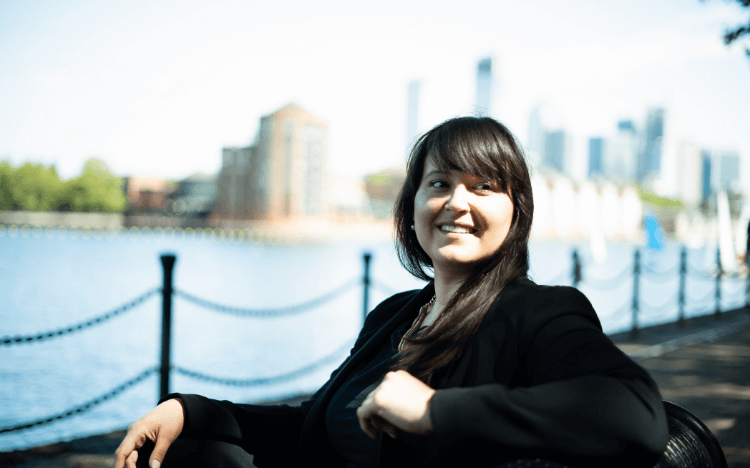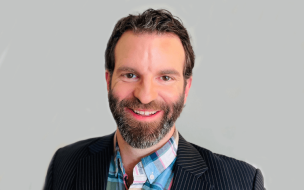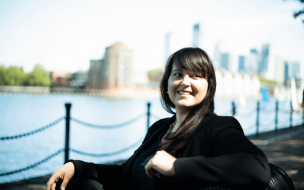Fast fashion is big business.
In the last 15 years alone, clothing production has doubled globally, as companies race to imitate the latest trends in a never-ending stream of disposable garments.
Unsurprisingly, the $1.4 trillion fashion industry is taking its toll on the planet. From toxic dyes to carbon-heavy shipping, producing clothes on this scale is profoundly damaging to the environment.
When Tammy Hydenrych discovered the destructive side of our fast fashion addiction, she saw an opportunity for change.
While studying an MBA at the Cranfield School of Management, Tammy set out with her business partner, Steven Cowcher, to create a company that would make fast fashion more sustainable.
A career change
Tammy wasn’t always an entrepreneur. In her native South Africa, she began professional life as an attorney.
After a few years of litigation work, Tammy moved into the corporate world, as a legal advisor for Zurich Insurance. Here, she was exposed to strategic and operational projects.
The work soon captured Tammy’s interest, and prompted a career change—along with an MBA.
Having family in the UK, Tammy decided a British business school was the right choice for her.
Cranfield stood out because of its focus on leadership skills, along with a professionally diverse student body.
“I didn’t want to go to school with a group of people exactly like me,” Tammy explains, “I wanted a different perspective—I wanted to learn from people who came from different walks of life.”
Into the dragons’ den
Over the course of her MBA, Tammy was drawn to the consulting projects on offer at Cranfield.
In one assignment, she and her team travelled to Sri Lanka, helping a small business to optimize their operating model and organizational structure.
“It was really rewarding,” Tammy remembers, “and quite different to my previous, corporate experience.”
Her highlight was the chance to get involved with the popular UK TV show, Dragons' Den (known as Shark Tank in the US).
On the show, entrepreneurs present their startup to a group of high-profile investors with the hope of securing funding.
Thanks to alumni connections on the show, Tammy and a few of her peers were selected to produce due diligence reports on the startups featured.
“It was an eye-opener,” she recalls, “It gave me some first-hand experience, and helped me build a solid network.”
After working on the show, Tammy felt it was time for a startup of her own.
Taking the leap
At Cranfield, Tammy met her business partner, Steven. “We both have a corporate background, and were looking for a complete lifestyle change,” she says.
The pair had worked together once before, on a consulting project that involved plastic recycling.
“We soon discovered that the clothing and textile industry, especially fast fashion, can also be hugely harmful to the environment,” she says.
“Almost 60% of clothing produced today ends up in incinerators or landfill within a year of being produced,” Tammy laments. “There has to be another solution.
“We realized that there was an opportunity to build a business that worked with the circular economy and was sustainable,” she says.
Together, Tammy and Steven left their corporate careers behind to found Unowned Ltd.
Unowned is an online platform that allows users to rent clothes. This allows them to experiment with new styles and trends, without having to purchase new clothes.
“We understand that our members want to look and feel great, but not at the expense of the planet,” Tammy explains.
Steven and Tammy put the idea for Unowned in front of a panel of MBA professors at Cranfield.
At the time, Tammy was interviewing with a handful of consulting firms, but the panel’s positive feedback inspired her to take a chance at entrepreneurial life.
“It was really scary for me!” Tammy remembers. “But once I made the decision, I knew it was the right choice.”
Fashion’s future
Tammy has big plans for Unowned. Her platform, she says, will reduce waste, allow brands to move excess inventory, and take advantage of emerging technologies to provide users with a better shopping experience.
For example, fit is a common issue for e-commerce platforms, often leading to high levels of returns.
“We’d like to reduce that,” she explains, “and simultaneously improve the user experience by using technologies like body scanning and avatars, where customers are able to see an item in 3D.”
Through Unowned, Tammy hopes to shift the world of fashion towards a more environmentally conscious outlook.
“I think it’s possible to build a profitable, successful company, while being kinder to the planet,” she says, “Those two do not need to be mutually exclusive.”







